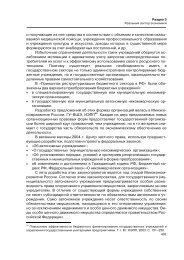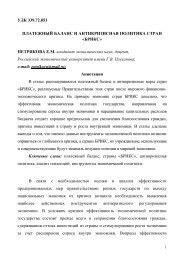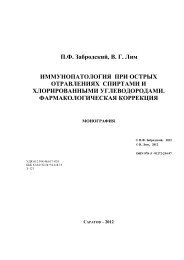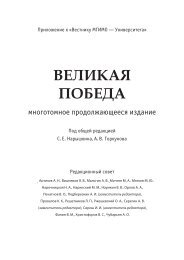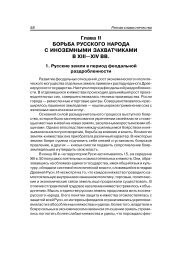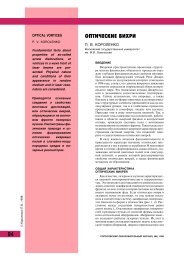Ensuring Strategic Stability in the Past and Present:
Ensuring Strategic Stability in the Past and Present:
Ensuring Strategic Stability in the Past and Present:
You also want an ePaper? Increase the reach of your titles
YUMPU automatically turns print PDFs into web optimized ePapers that Google loves.
Chapter 11: Selected Observations on <strong>the</strong> “Dyad” Relationship between <strong>the</strong>Russian Federation <strong>and</strong> <strong>the</strong> United StatesDespite <strong>the</strong> worsen<strong>in</strong>g of U.S.-Russia relations <strong>in</strong> recent years caused by <strong>the</strong> policy of <strong>the</strong> RepublicanAdm<strong>in</strong>istration of George W. Bush, <strong>the</strong>se relations did not escalate <strong>in</strong>to a new Cold War, <strong>and</strong><strong>the</strong> general background for secur<strong>in</strong>g strategic stability became more auspicious than it had beenfor <strong>the</strong> greater part of <strong>the</strong> second half of <strong>the</strong> 20th century. However, from <strong>the</strong> material po<strong>in</strong>t ofview, a number of parameters related to <strong>the</strong> secur<strong>in</strong>g of strategic stability look much worse todaythan <strong>the</strong>y did <strong>in</strong> <strong>the</strong> past.It is possible to highlight <strong>the</strong> follow<strong>in</strong>g circumstances that have an adverse effect on <strong>the</strong> perspectivesof secur<strong>in</strong>g of strategic stability.In 2002, <strong>the</strong> Bush adm<strong>in</strong>istration unilaterally withdrew from <strong>the</strong> 1972 ABM Treaty between <strong>the</strong>United States <strong>and</strong> <strong>the</strong> Soviet Union, which had been of <strong>in</strong>def<strong>in</strong>ite duration. That was a heavy,probably irreparable blow to <strong>the</strong> strategic stability of <strong>the</strong> dyad structure <strong>and</strong> of global stability asa whole. In <strong>the</strong> 1990s, <strong>the</strong> Cl<strong>in</strong>ton adm<strong>in</strong>istration carried on negotiations with Russia to def<strong>in</strong>e<strong>the</strong> dist<strong>in</strong>ction between strategic <strong>and</strong> non-strategic missile defense, with <strong>the</strong> aim of modify<strong>in</strong>g <strong>the</strong>1972 ABM Treaty. Let us recall that <strong>the</strong> ABM Treaty imposed serious limitations on <strong>the</strong> deployment<strong>in</strong> outer space of attack weapons that could be used for both missile defense <strong>and</strong> anti-satellitepurposes. At present, <strong>the</strong>re are no legal or contractual limitations on <strong>the</strong> deployment of strikeweapons <strong>in</strong> outer space, except for <strong>the</strong> deployment of nuclear weapons <strong>in</strong> space. Development of anational missile defense system became one of <strong>the</strong> pr<strong>in</strong>cipal issues of <strong>the</strong> Bush adm<strong>in</strong>istration. Asdist<strong>in</strong>guished Harvard professor <strong>and</strong> U.S. political scientist Graham Allison has said, <strong>the</strong> developmentof a missile defense system had become a matter of faith for <strong>the</strong> Bush adm<strong>in</strong>istration, butnot a matter of policy or military strategy. In <strong>the</strong> last few years, Congressional Republicans led by<strong>the</strong> late Jesse Helms, who chaired <strong>the</strong> Senate Foreign Relations Committee, stated that <strong>the</strong> 1972U.S.-Soviet ABM Treaty had lost its legal force after <strong>the</strong> dissolution of <strong>the</strong> USSR, <strong>and</strong> <strong>the</strong>refore refusedto ratify <strong>the</strong> 1997 ABM-TMD Demarcation Protocols. We should not expect <strong>the</strong> emergenceof a similar document, given that President Barack Obama has given his formal assurances to <strong>the</strong>U.S. Congress that <strong>the</strong>re would be no constra<strong>in</strong>ts on U.S. missile defense. 95Meanwhile, <strong>the</strong> ABM factor is becom<strong>in</strong>g an <strong>in</strong>creas<strong>in</strong>gly weighty issue alongside <strong>the</strong> achievementof reductions <strong>in</strong> <strong>the</strong> parties’ nuclear arsenals, warhead stockpiles <strong>and</strong> delivery vehicles. This wasrecurrently sized up <strong>in</strong> Russia through a series of computer simulations <strong>in</strong> <strong>the</strong> 1980s <strong>and</strong> 1990s.The ABM factor may be neutralized only by enhanc<strong>in</strong>g <strong>the</strong> combat stability of Russia’s strategicnuclear forces (SNF), improv<strong>in</strong>g <strong>the</strong>ir <strong>in</strong>vulnerability by conceal<strong>in</strong>g <strong>the</strong> bases where <strong>the</strong>y are located,<strong>and</strong> <strong>in</strong>creas<strong>in</strong>g <strong>the</strong>ir ability to break through missile defense systems. All <strong>the</strong>se activities areexpensive, <strong>and</strong> sometimes very expensive. Pursuit of <strong>the</strong> optimal profile of Russia’s SNF based on<strong>the</strong> “cost-efficiency-atta<strong>in</strong>ability” criterion is a very important task that requires various methodsof system analysis <strong>and</strong> operational research, <strong>in</strong>clud<strong>in</strong>g ma<strong>the</strong>matical computer simulation <strong>and</strong>supercomputer simulation.Hav<strong>in</strong>g considerably greater economic <strong>and</strong> scientific-technical capabilities than Russia, <strong>the</strong> UnitedStates was able, over <strong>the</strong> past 15 to 18 years, to afford more large-scale measures to ma<strong>in</strong>ta<strong>in</strong> <strong>the</strong>Belfer Center for Science <strong>and</strong> International Affairs | Harvard Kennedy School 49



